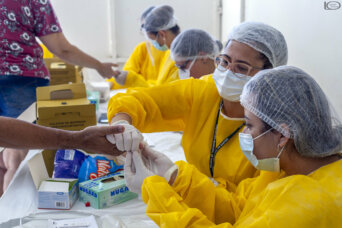- About
- Topics
- Picks
- Audio
- Story
- In-Depth
- Opinion
- News
- Donate
- Signup for our newsletterOur Editors' Best Picks.Send
Read, Debate: Engage.
| topic: | Health and Sanitation |
|---|---|
| located: | Brazil |
| editor: | Ellen Nemitz |
While almost every nation struggles to deal with the Covid-19 pandemic, which has been affecting health systems in unprecedented ways, chronic diseases and other infections continue to affect millions of people and to demand health care.
As World Health Day comes up on 7 April, the Pan American Health Organization, a local agency of the World Health Organization (WHO), listed some key actions for the Americas in 2021. Although properly addressing the pandemic and ensuring vaccination fairness are important issues, the organisation also calls on governments and societies to enable equal access to health facilities, tackle the growing rates of mental health disorders (which were drastically impacted by the pandemic) and strengthen scientific and digital capabilities, among other necessary measures.
In addition, it is important to keep preventing and treating noncommunicable diseases (NCDs), which include cancer, cardiovascular diseases, diabetes and chronic lung illnesses. While those conditions were proven to be responsible for around 5.5 million deaths just in the Americas each year even before the pandemic, according to the Pan American Health Organization, they now constitute a vulnerability for Covid-19 patients.
"It is clear that more effort is needed to ensure that NCDs are included in the national COVID-19 response plan,” says the Pan American Health Organization in a report. It also concludes that "infrastructure and methods for telemedicine, virtual consultations, and other strategies [must] be put in place to continue NCD service delivery during outbreaks and other health emergencies.”
Since we are still struggling to handle the pandemic - Brazil alone accounts for a quarter of global deaths as of late March and has experienced an almost complete collapse of its health system - governments must increase investments not only in short-term solutions, but also in seeking future responses.
During the panel Innovating Healthcare in Latin America and the Caribbean convened by Inter-American Dialogue, different professionals discussed the health situation in the region both before and after the pandemic, based on which they drew some future solutions to deal with noncommunicable diseases.
The current low capacity of health systems, combined with the fear of being infected by Covid-19 if visiting a hospital, may create an increased demand for medical assistance, for which countries must be prepared. “We’re going to experience a tsunami of demand going forward,” affirmed Rifat Atun, Professor of Global Health Systems at Harvard University.
The region will be particularly impacted, according to him, because of its social and income inequalities, high rates of informal work, unequal access to health services and lack of proper social security nets.
The solution, Atun claims, is to deal with those problems through innovation - as health systems did not develop at the same pace of society's needs - in addition to making investments in primary health care and technologies.
In order to properly deliver the new model of healthcare, there must be combined efforts from public and private sectors, as well as from civil society. “This is a challenge for everyone. We’re in it all together,” concluded Atun.
Image: Leandro Ordonez.

